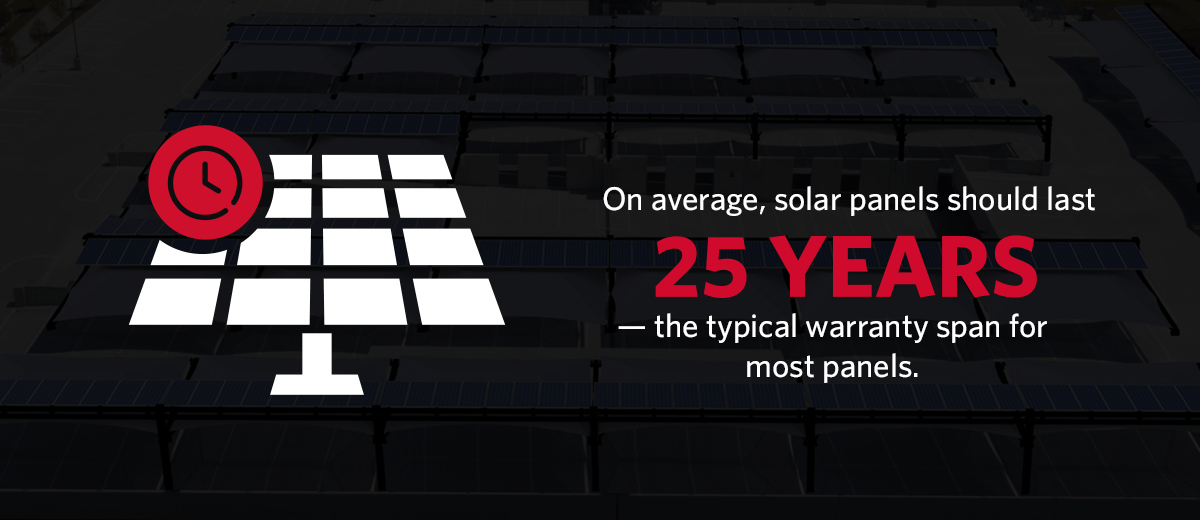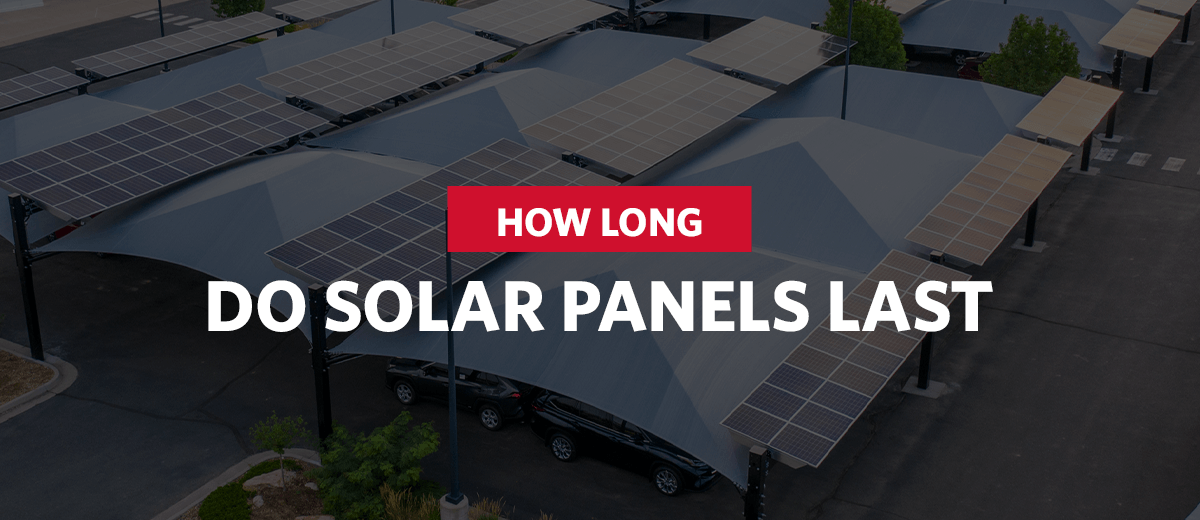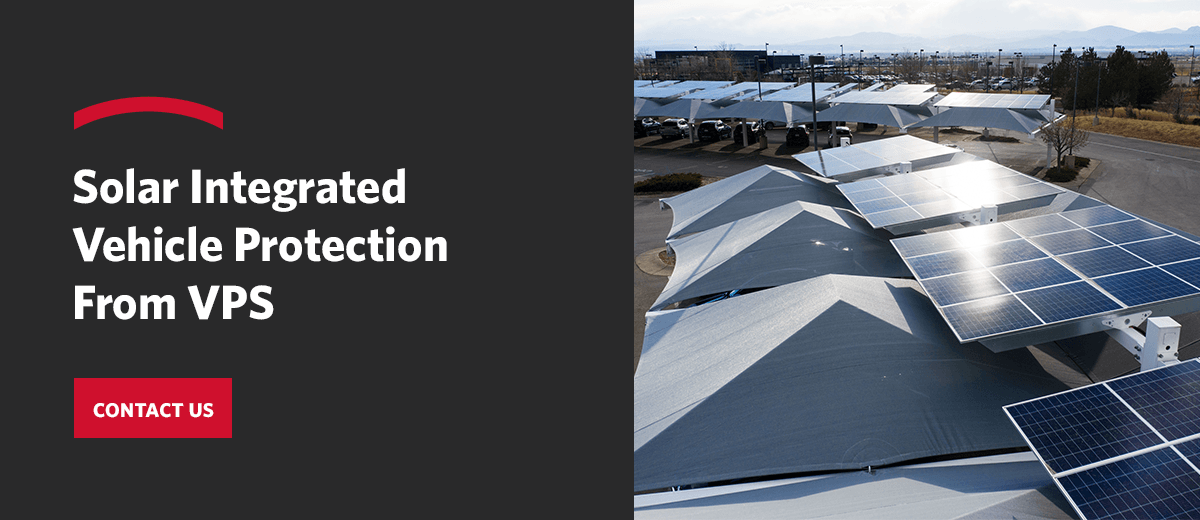Understanding the life span of solar panels is essential when planning a large-scale commercial installation. Longer life spans mean greater cost savings for businesses.
On average, solar panels should last 25 years — the typical warranty span for most panels. After this period, the panels are likely to degrade quite significantly. Choosing quality solar panels from a trusted manufacturer, installing them professionally, and maintaining them throughout is essential for getting the most efficiency and cost-saving benefits during their life span.
Businesses can take steps to make solar panels last longer and maximize their return on investment.
Key Factors Affecting Solar Panel Life Span
Several factors can affect solar panel longevity. Learn more about each below.
Solar Panel Quality
High-quality solar panels may cost more upfront, but they will not degrade as fast as inferior options. When choosing commercial solar panels, these features point to high-quality options:
- High energy efficiency: Solar panel efficiency relates to how well the panels convert light into energy. Quality solar panels will be more energy-efficient. Fewer panels are needed to get the same output, and they will charge faster.
- Size factors: Quality solar panels must have the right physical size and watts for one’s facilities. A roof or parking structure’s size will directly affect how many panels are needed, but choosing the right watts for a facility’s needs will ensure the panels generate maximum energy as efficiently as possible.
- Durability: Looking at a manufacturer’s warranty for their solar panels is a good indication of how durable they should be. Solar panels are quite low-maintenance, but inclement weather like strong winds, heavy rain, and snow can affect them if they are not durable enough.
- Solar cell type: There are different types of solar cells, including polycrystalline, thin-film solar cells, and monocrystalline. Monocrystalline solar cells perform the best compared to other types, especially in low sunlight. Polycrystalline cells are more affordable than monocrystalline cells but less energy-efficient. Thin-film solar cells are cheap to produce but cost far more per kilowatt to operate, as they take up more space.

Solar Panel Maintenance
Solar panels are relatively low-maintenance components, but properly caring for them can still increase efficiency and life span.
A robust solar panel upkeep plan should include the following:
- Schedule regular inspections. Regular inspections help identify and address common issues that could affect the longevity of solar panels. During these inspections, one can check for wear and tear, loose connections or wiring, shading or obstructions from trees and buildings that can affect performance, and an accumulation of debris.
- Prioritize regular cleanings: Dust, dirt, and animal droppings can all buildup on solar panels and affect their efficiency and life span. A buildup of dirt and other debris reduces the amount of light that reaches the cells, so the panels should be regularly cleaned to maintain performance. A slightly damp microfiber cloth and mild soap water should be sufficient for the panels. No harsh cleaners or abrasive materials should be used for this process.
- Conduct proactive repairs and replacements: Neglecting components that need to be repaired or replaced can be detrimental to the entire setup. Even one solar panel failing can affect the others’ performance. Promptly addressing potential issues or damage with solar panel systems is also key to fostering longevity. Contact a professional quickly if you suspect an issue — doing so can help combat problems from becoming more serious and expensive repair needs.
Installation
Choosing skilled experts for a commercial solar panel installation is vital for ensuring the system’s overall performance and longevity. If installed incorrectly, solar panels can experience overloading, shorts, and fires.
An improper installation can involve inadequate grounding, faulty wiring, and a lack of proper ventilation to stop the panels from overheating. Incorrectly installed solar panels are less efficient, unlikely to last long, and can be hazardous.
Always work with a vetted solar panel provider. Explore customer testimonies and reviews to ensure partnering with a professional who understands installation best practices and takes pride in their work.
Weather and Climate Conditions
With the latest innovations, solar panels are better equipped to perform efficiently under various weather conditions. If the panels are made from inferior materials, inclement weather might affect them, but high-quality panels are tested to withstand different stressors.
The greatest concern for the longevity of panels is prolonged exposure to extreme heat. Significant temperature increases can reduce the energy the panels generate, especially because heat can decrease electrical current speeds.
The Importance of a Good Warranty
A good warranty ensures facilities get the most out of their solar panels for their entire life span. It protects facilities against factors like manufacturing defects and also guarantees that the solar panels will maintain a specific percentage of their original output yearly.
Frequently Asked Questions About Solar Panel Life Spans
Explore the answers to these frequently asked questions to better understand solar panel life span, degradation factors and when to replace panels:
Do Solar Panels Degrade in Storage?
Solar panels can degrade if the conditions in storage are not conducive to their longevity. If the panels are exposed to UV light or moisture during storage, it can affect their efficiency and their life span.
How Long Do Solar Panels Last if They Are Well-Maintained?
Maintaining solar panels helps ensure they perform well for the duration of their warranty. However, external factors like weather, defects or faulty installation can affect their longevity even if the panels are well-maintained. Under exceptional circumstances, high-quality solar panels may last up to 40 years with careful maintenance.
When Is It Time to Replace Solar Panels?
There are several indications that it is time to replace solar panels:
- The panels are old and no longer under warranty, which would make it difficult to repair or upgrade.
- There has been a significant decrease in the panels’ energy output.
- The panels are corroded or burnt.
Consulting a professional solar panel installer or repairer is an effective way to determine when to replace panels.
Solar Integrated Vehicle Protection From VPS
Facilities can enjoy greater longevity, energy efficiency, and cost-saving benefits when investing in high-quality solar panels. VPS proudly offers customized solar-integrated vehicle protection solutions to elevate commercial parking structures.
We help companies provide cooler, shaded parking for their teams and reap the benefits of reduced energy consumption. Our business has the manufacturing capabilities to cover large commercial parking spaces, contributing to our status as leaders in the industry. VPS has over three decades of experience and is accredited by the International Accreditation Service (IAS). Companies can feel good knowing we understand and comply with relevant industry standards for hail protection structures and solar panels.
Contact VPS today to learn more about our solar panel-covered parking solutions.

